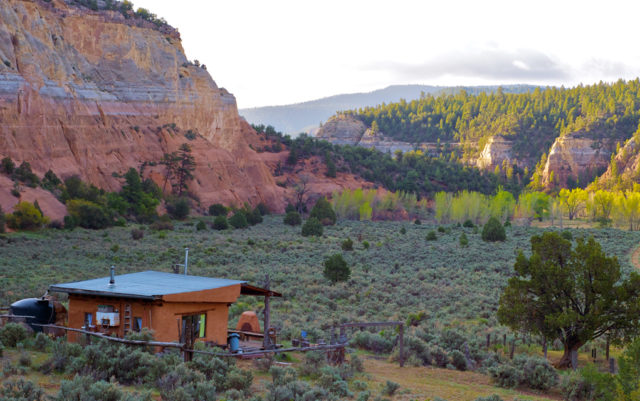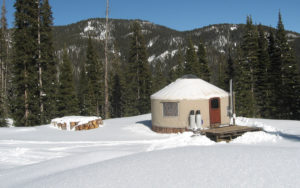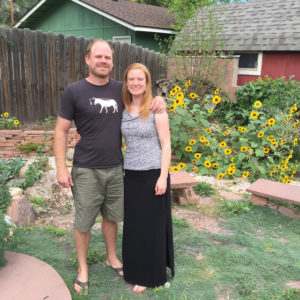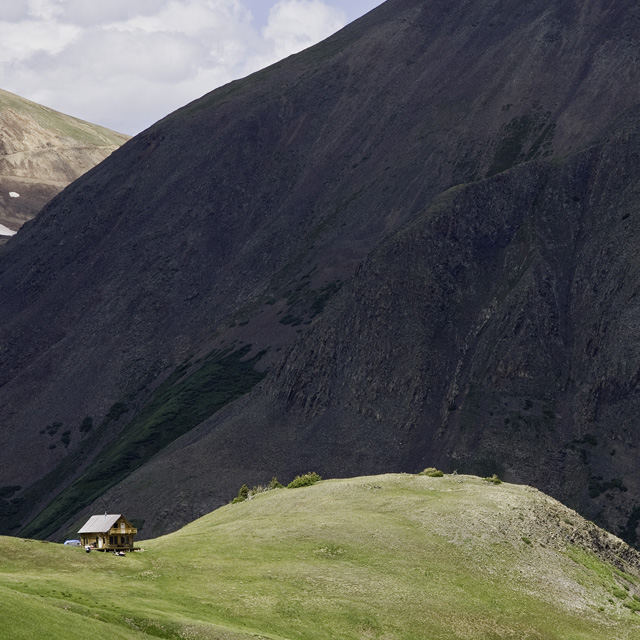
For green enthusiasts, off-grid housing is emerging as a way to actualize sustainable living. Whether as a means of reducing consumption, returning to a more primitive lifestyle or as a political action against reliance on the proverbial “man.”
Self-reliant, these homes don’t depend on “the grid” — a network of public municipal systems that provide utilities. Instead, these properties provide for themselves using renewable energy for power, well systems for water and composting systems for waste treatment. Or sometimes forgoing utilities altogether.
But in Colorado, off-grid housing predates the sustainability movement existing as a reality of mountain living. Over time, various self-sufficient shelters were built on the vast Western landscape — like ski huts far in the backcountry, hunting lodges in hidden forests and humble adobe huts at the end of long dirt roads.

While many a Colorado family has or knows someone who has an off-grid property, few people live in these homes all year round — whether due to the seasonality of access or the practicalities of modern living, many off-grid properties are second homes.
It wasn’t until the rise of Airbnb that there was a way to both increase use and monetize these properties, and it wasn’t until June that Sarah and Jason Stillman opened Freehouse, a locally owned and operated online off-grid vacation rental company.
“We only list properties with no outside infrastructural support,” he says. “That is where the line is drawn. Some of our places have internet, some of them don’t. Some of them you have to hike or ski miles in just to get to them, some of them you can drive right up to. Either way these properties are out there — off the grid.”
The concept for the startup is woven into the Stillman’s relationship. Two years ago, they were married in Mexico at an off-grid property owned by Sarah’s father, a prophetic beginning for the business that would be born a few years later.
“It is a relief to get way out there and be all alone,” Jason Stillman says. “One of the really cool things about going off the grid is that you are out there and usually don’t have neighbors or other people around so it is an opportunity to do whatever you want to without bothering anybody.”

A rebellious smile spreads across his face as he tells about the celebratory bonfire they built on the beach after the wedding. A remark from Sarah’s brother sums up the sentiment well, he says: “No cops, and nudity.”
Within the behemoth vacation rental market, the Stillmans found a niche and are learning how to appeal to its customers’ various needs — offering properties that provide a detox from digital life, a backcountry experience with a bed or a total retreat from society.
Soon, the website will include a way to qualify the renters too, so that hosts can rest assured users will have the snuff to make it safely to their extreme properties.
“If you have a property that is particularly gnarly to get to, there are some concerns about liability in renting it to the general public,” Jason Stillman says. “So we are adding in functionality so that a host can look at a prospective renter’s endorsements, like whether or not they have taken avalanche classes before agreeing to let them stay at their backcountry ski hut.”
Liability issues aside, there are other concerning implications of off-grid vacation rentals, such as the environmental impact of increased habitation in secluded environments — especially in sensitive ecosystems such as the high alpine or desert where many of Freehouse’s properties are located.
For example, the San Juan mountain range in Colorado is rich with cryptobiotic crust, the uppermost layer of soil rich with bacteria, lichen and moss that takes decades to grow just a few millimeters deep. Freehouse hosts a handful of properties in the area, a nice getaway indeed, but such a delicate ecosystem can be destroyed by a single unknowing footstep.

For the Stillmans, those are worries for another day. They have only had a handful of rentals so far and feel comfortable that property owners maintain enough control over their properties to put a stop to any adverse environmental or community impacts.
As Freehouse grows, the young couple is starry-eyed, dreaming about all of the possibilities within their business’ niche. But for now they are happy to be working on an outdoorsy business of their very own, and they are also taking the chance to get away themselves.
“Right now success for us could mean a lot of things, but I just hope we get to go see some of these properties for ourselves,” Sarah Stillman says, as a big smile spreads across her face.














